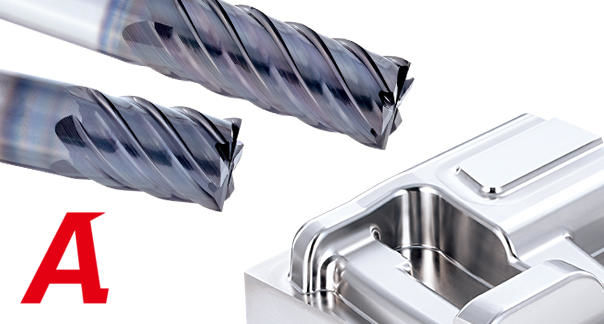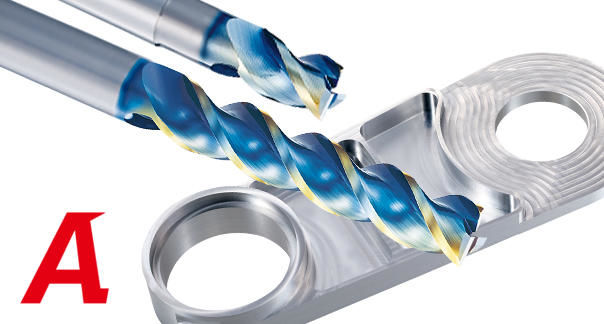

We are pleased to announce the expansion of our A Brand AE-H Advanced Performance Carbide End Mill Series for high-hardness steels.
The following list numbers are associated with the A Brand AE-H End Mill Series expansion:
- List #8540 A Brand AE-MS-H Multi-Flute, Square, Regular Length (Metric)
- List #8541 A Brand AE-MSS-H Multi-Flute, Square, Stub Length (Metric)
- List #8440 COMING SOON! A Brand AE-MS-H Multi-Flute, Square, Regular Length (Inch)
- List #8441 COMING SOON! A Brand AE-MSS-H Multi-Flute, Square, Stub Length (Inch)
Features & benefits include:
- Multi-Flute
- Variable indexing for suppression of cutting vibration and chattering
- Unique cutting edge geometry for stable machining of high-hardness steels up to 70HRC
- DUROREY Coating for outstanding performance and tool life
EXOCARB® WXS End Mills- PHASE OUT
We are in the process of phasing out and discontinuing the following list numbers associated with EXOCARB® WXS End Mill series, which is being replaced by the NEW A-Brand AE-H End Mills.
List #4540 WXS-EMS (metric)
Limited quantities of the above EXOCARB® WXS End Mill continue to be available, while supplies last.
Check out the new tools HERE
.jpeg)
We are pleased to announce the expansion of our Additive Manufacturing Series with EXOCARB® AM End Mills and OSG PHOENIX® PXFH-AM exchangeable heads.
The following list numbers are associated with the expansion to the Additive Manufacturing Series:
- List #4630 EXOCARB® AM-EBT 3-Flute,Stub Length, Ball End (Inch)
- List #4670 EXOCARB® AM-CRE 3-Flute,Stub Length, Corner Rad(Inch)
- List #4970 EXOCARB® AM-HFC High-Feed Radius (Metric)
- List #78PXHF-AM OSG PHOENIX® PXHF-AM Exchangeable Heads
Features & benefits:
AM-EBT:
- Extremely negative rake angle for superior performance in high-hardness steels and welded materials
- Large chip pockets to handle large variations in chipload
- Large relief to prevent re-cutting and enable polishing
- DUROREY coating optimized for high hardness steel machining
AM-CRE:
- Extremely negative rake angle corner radius offers greater protection in high-hardness multi-layered parts
- Large chip pockets enable cutting with large allowances in chipload
- Unique geometry that enables smooth cutting and polished surface finish
- DUROREY coating optimized for high hardness steel machining
AM-HFC and PXHF-AM:
- Optimized with a composite radius for flat surface machining.
- Features coolant-through to improve chip evacuation and prevent chip packing
- DUROREY Coating for outstanding performance and tool life

We are pleased to announce the release of our A Brand AE-N End Mill Series for non-ferrous materials!
The following list numbers are associated with the A Brand AE-N Series:
- List #8630 A Brand AE-TL-N 3-Flute, Long Length (inch)
- List #8730 A Brand AE-TL-N 3-Flute, Long Length (metric)
Features & benefits include:
- Center cutting edge ideal for plunging
- Large core and new flute form for high rigidity and excellent chip evacuation
- Unique cutting edge that achieves high durability and good surface finish
- DLC Super hard coating for superior surface accuracy and finish
Check out the new tools HERE
Ultra-small and some of the utmost critical parts of an aircraft
Linn Win | National ADU Product Manager at AMAMCO Tool
A fastener is a hardware device that mechanically affixes two or more objects together to create a joint. A wide variety of fasteners are used in the aerospace industry, including rivets, nuts, bolts, screws, and more. Fasteners may not be as exotic as a jet engine, but that does not make them insignificant to an aircraft’s well-being. For instance, there are nearly one million such fasteners in a Boeing 747, all of which are essential to the jetliner’s structural dependability. Nowadays, with the progress of innovation, we are seeing more planes that require less fasteners due to implantation of lightweight composite materials. Even with this innovation of using less fasteners, the ones that remain must be held securely in place in order for the aircraft to achieve the title of flightworthy. Even for a multi-million-dollar spacecraft – an invention that is expected to endure the extreme environment of space travel – are fastened together with rivets, which are not all that different than those found on an airplane or a leisure boat.
Ironically, a large percentage of these fasteners are still installed in the same way they were 30 years ago: by hand. Several methodologies exist, but the most prevalent is the use of a pneumatic drill motor assembled together with a spring-loaded microstop, and a cutting tool. The cutting tool itself is typically a piloted 100° or 130° countersink with a threaded shank that screws into the microstop. The aircraft technician sets the stroke to the desired depth, places the tool’s pilot into a pre-drilled hole, engages the drill motor, and then push down to produce a countersink feature.
Fortunately, there have been some advancements in the methodology of hole-making. The first is the semi-automated ADU (automated drilling unit), capable of drilling and countersinking in a one-shot operation. There are also robotic and fully automated systems that not only produce an accurately countersunk hole, but install the rivet as well, commonly known as drill and fill.
One thing remains despite what method one may choose; some type of a support like a backing bar is required to achieve a smooth hole-making operation and not experience deflected aircraft skin. In other situations, when trying to avoid debris from entering the aircraft, before rivet installation, one must disassemble two or more sections of material clean, deburr and reassemble then proceed with the installation. Forming a countersunk hole for fastener installation on an aircraft fuselage can be a complex and time consuming process, compared to chamfering a hole in a machined part. To make the process even more difficult, each aircraft manufacturer is now using a broad array of materials to build their aircraft. Composite based materials are taking over the industry and knocking off the concept of all-aluminum aircraft skins. Some applications may even involve sandwiched materials that are stacked with metallic, creating challenges for cutting tool manufacturers. Lastly, each aerospace manufacturer has their own set of fit requirements for their fasteners, which may vary from one aircraft to another, or even for specific areas within an individual aircraft.
The requirements vary greatly based on the size of the plane, the load and stress of a mating section, and the manufacturer. Cutting tool manufacturers must, therefore, deal with a broad range of materials and thicknesses, hole sizes, hole requirements, as well as different methods of fastener installation and hole preparation, making it difficult to standardize cutting tools. Because of this variability, cutting tools must often be customized to fit the fastener and its unique application.
OSG has supplied cutting tools for the processing of aircraft parts around the world for many years and has built a high reputation for its capability to effectively process difficult-to-machine materials such as superalloys and composites. AMAMCO Tool, a subsidiary of OSG USA, Inc. since April 2016, is a custom, cutting tool manufacturer that designs and produces application-specific cutting tools primarily for the aerospace and composite industries. AMAMCO Tool’s core products include drills for hand, CNC and advanced drilling units (ADU). The company also manufactures high quality diamond coated routers and drills currently used by all major and Tier 1 aerospace manufactures in the United States and abroad. Along with its innovative partner, OSG will strive to continue to shape the future flight path of aerospace technology with innovative cutting tools solutions.



 Contact Us
Contact Us  Product Search
Product Search 